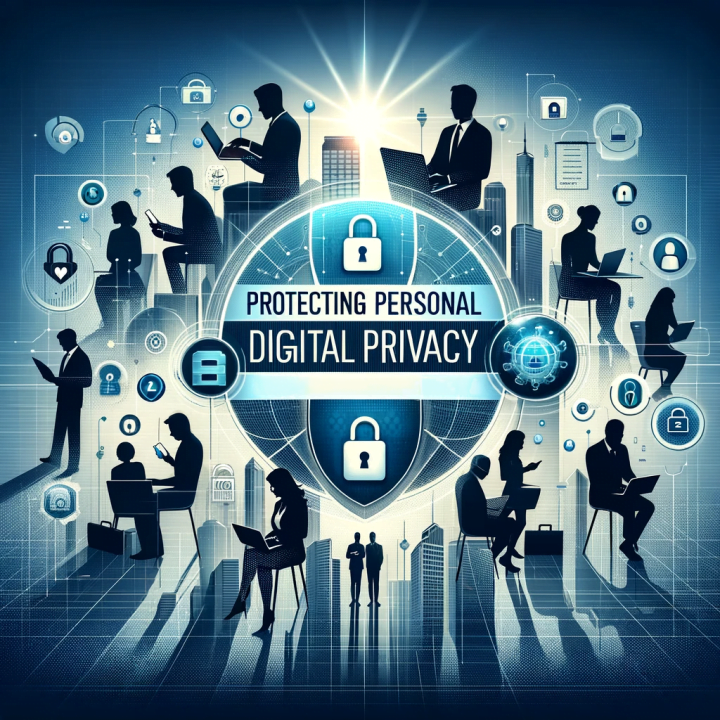Why Personal Privacy Matters to Corporations

Protecting Personal Digital Privacy: A Win-Win for Employees and Employers
The line between personal and professional life is increasingly blurred in the digital era. As technology continues to integrate into every aspect of our lives, personal digital privacy has emerged as a crucial concern, not just for individuals but also for employers. Understanding personal digital privacy, its implications on the workforce, and the symbiotic relationship between an employee’s privacy and a company’s security is vital for building a resilient and trustful organizational culture.
An employee who is motivated to protect their own privacy will also, indirectly, be protecting their employer’s cybersecurity posture. The tools and techniques used to enhance privacy often align with the steps to enhance cybersecurity efforts. When an employer invests in an employee’s privacy awareness and training, they gain a motivated employee who can protect themselves and safeguard the company.
People are motivated to protect their own privacy and that motivation should be used effectively.
Understanding Personal Digital Privacy
Personal digital privacy protects an individual’s sensitive information, communications, and online activities from unauthorized access, use, or disclosure. This encompasses vast data, from personal identifiers and financial information to communication records and online behavior patterns. As employees increasingly use their devices for work-related activities, ensuring the privacy of these digital interactions becomes paramount.
Why It Matters to Employers
1. Building Trust
Ensuring respect and support for employees’ digital privacy is critical in building a trustful, harmonious, and productive work environment. When employees are confident that their personal information is secure and that their privacy is acknowledged, valued, and prioritized by their employer, it creates a sense of security and trust. This trust then reflects in their engagement and satisfaction levels at work. It encourages them to be more dedicated and committed to their roles, knowing their employer respects their boundaries. Additionally, it can lead to a positive perception of the company, reinforcing its reputation as a responsible and respectful employer. In a time when digital privacy has become a significant concern, employers have a vital role in ensuring the security and privacy of their employees, which in turn can lead to a more satisfied and engaged workforce.
2. Enhancing Security
When employees are conscious of their digital privacy and actively take steps to protect it, it has a beneficial ripple effect that inadvertently strengthens the organization’s overall security posture. By practicing responsible digital behavior and secure online habits, employees can significantly reduce the risk of falling victim to security threats such as phishing attacks and malware infections. These threats, if not adequately defended against, can result in significant security incidents that could compromise personal and company data. Therefore, by being vigilant and proactive in their individual digital security, employees are not just protecting their personal information but also contributing to the safeguarding of the organization’s sensitive data.
3. Fostering a Culture of Privacy
Promoting awareness of personal digital privacy among employees is an important task and a necessary endeavor within a modern organization. By fostering such understanding, we encourage a culture steeped in privacy and security, which is integral to the smooth operation of any organization in this digital age. This culture, built on the foundation of privacy awareness, is a strong and effective deterrent against potential data breaches, which are increasingly common and damaging. But it doesn’t stop there. It also bolsters the company’s reputation for customers, clients, and partners. When a company is known for being responsible and trustworthy, especially when handling data and information, it stands head and shoulders above the rest. Thus, by promoting personal digital privacy awareness, we protect our organization and strengthen its standing in a competitive market.
Supporting Employee Privacy: A Proactive Approach
1. Privacy Education and Training
We can ensure our employees are well-equipped and knowledgeable about protecting their personal information by providing regular training sessions, workshops, and resources focused on personal privacy. This education is crucial for their security and plays a significant role in safeguarding the company’s sensitive data. The more they understand the potential risks and threats, the more effectively they can prevent breaches. Therefore, it is essential to continually emphasize the role of personal digital privacy in the broader context of the company’s data security measures.
2. Encouraging Secure Practices
It is critically important to promote the use of robust, complex passwords, the implementation of two-factor authentication measures, and the utilization of secure Wi-Fi connections at all times, even when using personal devices. These best practices significantly enhance personal digital privacy, creating a robust first line of defense against potential cyber threats. By strengthening individual security measures, we protect personal information and contribute substantially to protecting the organization’s overall network and data. This further ensures the integrity and confidentiality of sensitive organizational information, ultimately safeguarding the organization’s reputation and operational continuity.
3. Clear and Transparent Policies
It’s essential to implement clear, transparent, and comprehensive privacy policies that provide detailed explanations on how employee data is collected, utilized, and safeguarded. These policies should provide a thorough understanding of the data collection process, the purpose for which the data is used, and the strategies employed to ensure its protection. Furthermore, it is paramount that these policies respect each individual’s privacy rights and strictly adhere to all the relevant data protection laws and regulations in place. By doing so, we ensure the privacy and security of our employees’ information, build trust, and promote a culture of transparency within our organization.
4. Providing Tools and Resources
We must provide employees with various tools and resources to safeguard their digital privacy. One of these tools includes secure Virtual Private Networks (VPNs), which create a safe and encrypted connection over a less secure network, like the Internet. This ensures that any data sent or received is protected from unauthorized access.
Another resource we can offer is encrypted communication channels. These channels use encryption algorithms to secure all communication, making it unreadable to anyone except the intended recipient. This is essential for preventing sensitive information from falling into the wrong hands.
Finally, we should also consider offering privacy-focused software. This software is designed to protect user data and prevent tracking, making it a powerful tool in the fight against digital privacy invasion. Employees can better protect their digital privacy with these resources at their disposal.
The Symbiotic Relationship
Protecting personal digital privacy is not just an individual responsibility; it’s a collective effort that has far-reaching benefits for employees and employers. When employees feel supported in protecting their privacy, they are more inclined to adopt secure practices. These secure practices often extend beyond protecting their personal information and safeguarding the organization’s data and infrastructure. This mutual understanding and collective action can significantly reduce potential vulnerabilities that malicious actors could exploit. Therefore, the organization becomes more secure and enhances its privacy and resilience against a wide range of cyber threats. This can be an essential factor in ensuring a company’s long-term success in our increasingly digital world.
Protecting personal digital privacy extends beyond just being an individual responsibility; it’s an essential collective effort that significantly benefits all parties involved, including employees and employers. When employees feel their privacy is respected and actively supported in their efforts to protect their personal information, they are likely to adopt and maintain secure practices.
These practices often go beyond merely safeguarding their personal information, extending to protecting the organization’s data and infrastructure. This sense of shared responsibility and mutual respect can significantly reduce potential security vulnerabilities that malicious actors could otherwise exploit.
In this way, the organization gains enhanced security, bolstered privacy, and increased resilience against various cyber threats. This collective approach to personal digital privacy can also foster a culture of trust and cooperation within the organization, leading to a more harmonious and productive work environment.
Moreover, this commitment to privacy can also positively influence an organization’s external reputation. In an era where data breaches and privacy scandals can cause significant harm to a company’s brand, demonstrating a strong commitment to personal digital privacy can help distinguish an organization as a trustworthy and responsible entity.
This proactive and collective approach to protecting personal digital privacy not only secures the individual rights of employees but also fortifies the organization’s overall security and privacy framework. Ultimately, it creates a secure, trusting, and resilient work environment, ensuring that both employees and employers can effectively navigate and thrive in the digital age.
Building Privacy Through Security
Personal digital privacy is a critical component of digital security and well-being. Employers are instrumental in promoting a culture of privacy and security among their staff. By helping employees protect their digital privacy, organizations safeguard individual rights and strengthen their own security and privacy measures. This proactive stance fosters a secure, trusting, and resilient work environment, ensuring employees and employers prosper in the digital era.
In today’s technologically advanced world, the importance of personal digital privacy extends beyond the individual to the organization. Trust in the digital space is a valuable commodity, and employers can foster this trust by actively supporting their employees’ digital privacy. This investment in digital privacy not only helps safeguard employees’ individual rights but also strengthens the overall security and privacy of the organization.
Employees who feel their digital privacy is respected and protected will likely feel more secure and committed to their roles. Such a positive work environment invariably leads to increased productivity and loyalty, benefiting both the individual and the organization.
Moreover, its clients, partners, and the wider public view an organization that values and prioritizes digital privacy favorably. This reputation for being responsible and trustworthy can give an organization a competitive edge in an increasingly digital market.
In conclusion, the proactive protection of personal digital privacy is the cornerstone of a secure, trusting, and resilient work environment. It is a win-win approach that ensures employees and employers thrive in the digital age.
